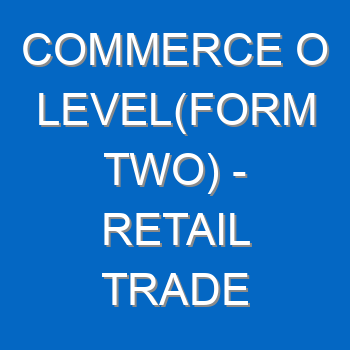Share this:
IMPORT TRADE
What is it?
Is the purchase of goods or services from other countries.
TYPES OF IMPORT
Import trade may be classified into two parts of:
- Direct import trade.
- Indirect import trade.
Direct import trade.
Is the kind of import on which a person in his own name import goods or services without making use of middlemen. Normally such kind of import will be done for a person own consumption rather than selling
Indirect import trade.
Is a kind of import on which a person purchase goods or services through the use of middlemen, professional importers, import merchants and the like. Normally such kind of import will involve bulk purchase and will be done for the sake of selling in home market.
TYPES OF THE INFORMATION NEEDED BEFORE IMPORTATION
- To know the procedures and formalities of importing in various countries.
- To know the culture of people around the world before supplying goods.
- To know the international exchange rates to achieve profitable transactions.
- To know the changes brought about weather conditions in various parts of your source of supply/ import.
- To know the technological changes with regards to the goods you are dealing with.
- To know the total cost of goods to be imported up to your premises .
SOURCES OF INFORMATION FOR IMPORTER
The following are some of the institutions or organizations which will help importer to get information about import trade
The following are some of the institutions or organizations which will help importer to get information about import trade
- Tanzania Chamber of commerce, industry and agriculture (TCCIA).
- Foreign firms representatives in the country.
- Board of external trade BET.
- The consular services.
- International trade fairs.
- Newspapers, journals, publications (through advertisement)
- Visiting various websites.
- Direct contact with the foreign exporters through several means of communication.
1.Tanzania Chamber of commerce, industry and agriculture (TCCIA):Is an organization which was established in 1988 with the support of the government of Tanzania to strengthen the private business sector throughout Tanzania.TCCIA has members and branches almost in all regions which are autonomous in their operational activities
Services provided by TCCIA
- Offers expertise in many areas of interest to local businesses through seminars, workshops and training, example seminars as topics of burning issues.
- Advice: Businesses get advice face to face or forward questions via e-mail.
- Providing business supportive initiatives which includes business license.
- Business promoting activities like National and International trade affairs, International delegations these in turn give members the possibility to increase trade opportunities.
- TCCIA receivers a great number of business inquiries from all over the world.
- Publications: Business information about companies typing to find customers or suppliers are published and distributed to all member.
- To settle disputes among members.
INTERMEDIARIES IN IMPORT TRADE
- Who are these intermediaries?
These are specialized traders in import trade. They perform the following roles
- Ordering the goods.
- Documentation.
- Receiving the goods.
- Clearing and forwarding the goods.
- Distributing the goods.
Who are they?
1. Import merchants.
These are intermediaries who buy goods from abroad in their own name and sell them locally. They maybe wholesalers or middlemen. They normally deal in general merchandise.
2. Import commission agents.
These are traders who import goods at overseas sellers’ risk. They are sent consignment by overseas sellers and market they are goods locally at the best price. They are paid commission from the proceeds of sale in an agreed percent. If goods are not sold/ unsold stock, they can return them at the sellers’ expense.
3. Import brokers.
These are people who do not buy or sell goods themselves but arrange deals between buyers and sellers. They possess knowledge of available market both locally and internationally and hence connecting the importers with exporters. Finally they are paid commission known as brokerage.
4. Stockist distributors.
These are merchants who are specialized in importing goods of a particular type which are skilled on them. They normally offer other services like “after sale services”, repairs and distribution of commodities to consumers.
Indent house;
is an import agent of a firm who import goods on order received from the domestic buyer. The importer enter into agreement with the indent house for the supply of certain specified goods by filling and signing special forms regarding the full descriptions of goods to be imported.
Manufacturers representatives
Those traders who represent manufacturers in a foreign country whose duty is to sell manufacturers products in the country they represent.
IMPORT PROCEDURES AND DOCUMENTATION IN TANZANIA
In order to import goods in Tanzania, the following procedures may be followed.
In order to import goods in Tanzania, the following procedures may be followed.
- Making an inquiry: This requesting information on goods to be imported. This can be made orally, electronically through an internet or by writing a letter.
- Contract to buy goods: An importer enter into contract with exporter and receivers a pro-forma invoice.
- Applying and obtaining import permit or import license from legal empowered body. Sometimes government permit importation of some goods without import license, such goods are shown in the open in general license (OGL) list issued by the Government from time to time.
- Arrangement for payments.
- Receipt of the shipping documents and documents of the title.
- Customs Clearance: Customs Clearance can be done by clearing and forwarding agents.
- Collection of goods: A bill of entry is prepared and submitted to customs officer and goods are released after payments of important duty (if any).
- Bill of entry is a document containing the name of the port of which goods are received, name of the ship, descriptions and value of the goods entering the country.
IMPORT CONTROL.Is a action taken by a country to regulate the volume of goods to be purchased from the foreign country. This will be among the measures to protect the balance of payment being disequilibrium (unfavourable).
Advantages of controlling imports
Advantages of controlling imports
- To protect infant industries at home against imported goods.
- To make a country self reliant.
- To reduce the balance of payment problem.
- To encourage specialization at home.
- To avoid the entry of harmful commodities into a country.
- Enable a country to develop its own natural resources.
Disadvantage of controlling imports
- Resources misuse by protected industries because this will encourage inefficient industry to remain in a business. This results to misuse of resources.
- Increasing costs: High tariffs on raw –materials imported increase the cost of production while tariffs on finished goods raise prices and cost of distribution which can cause inflation.
- Encourage poor quality of goods: Protected industries may become careless and produce poor quality products.
- Protected industries may fail to produce enough to meet demand appropriately hence storage of goods in the local market.
- Monopoly creation: When the industry is comprised with few organized firms protection may cause monopoly which can lead to poor services delivery.
- Smuggling: High tariffs encourage smuggling because importers are not willing to pay high tax levied on imported goods.
- Limited choice to consumers especially for goods produced abroad.
Methods or ways of controlling importation/imports
- Imposing heavy tariffs:Tax or duty levied on traded commodities crossing the national boundaries.
- Fixing import quotas: Fixing maximum units or value of goods/services for import allowed.
- Total ban policy: A complete prohibition of importation of named goods.
- Exchange control policy: Through the central bank a country restrict among of foreign currencies available for importing goods.
- Subsidization policy: Government may subsidize domestic producers to enable them to complete with foreign sellers, hence low price for home goods.
- Adopting devaluation policy:Deliberate action by government to reduce the value of her currency so as to make import expensive.
INTERNATIONAL COMMERCIAL TERMS (INCOTERMS)
INCOTERMS are different price quotations, terms and conditions employed in international transactions specifying who is to incur or not to incur certain duties during importation of
commodities between the importer and exporter.
commodities between the importer and exporter.
IMPORTANCE OF INCOTERMS
- They are useful in identifying the duties and obligations of each part i.e exporter and importer.
- They are indicating the lines of demarcation of duties and an obligation i.e where the exporter ends and where the importer begins.
- They are influencing both the importer and exporter to do their utmost to fulfill the terms and conditions agreed upon hence better performance.
- They are governing the methods and responsibilities as well as accountability in affecting payments of costs to be incurred e.g terms of delivery decide who pays the costs of transportation and incidental charges.
The following are some INCOTERMS;
- F.O.R (Free on rail) ─ Which include expense of packing and delivery up to the railway station in the exporter’s country.
- FRANCO ─ Include all expenses such as import duty, carriage and delivery charges, dock charges and delivery up to the importer’s premises.
- F.O.B(Free on board)─ Which include all expenses such as packing, loading charges, export duties etc to be covered by the exporter for taking goods until they are delivered on board the ship.
- F.A.S (Free Along side Ship)─ The price consists of all expenses such as dock charges packing and carriage to be covered until the goods are placed along side the ship.
- C.& F (Cost and freight) ─ The quotation refers to mean that the exporter bear all expenses of carriage, export duties, freight charges, loading charges, etc except insurance up to the port of destination
- C.IF (Cost, Insurance, Freight ) ─ Covering all expenses under C.& F quotation plus insurance.
- C.I.F.I.(Cost, insurance, freight and interest) ─ Covering all expenses under C.I.F quotation plus interest on the value of goods.
- C.I.F.& E ─ (Cost, insurance, freight and Exchange) ─ Covering all items of expenses under C.I.F risks of exchange fluctuations.
- C.I.F.& C(Cost, insurance, frei
ght, interest and commissions) ─ Covering all expenses as per C.I.F.I quotation plus the commission of importer’s agent. - C.I.FF.O(Sale Cost insurance freight and free out) ─ This means that the seller is responsible for all charges until the goods have been discharged at the port of destination.
- FREE DOCKS – The price include all expenses until the goods reach the docks.
- EX-SHIP(FREE OVERBOARD) ─ Which include all expenses up to the port of destination.
- PRICE IN BOND ─ Which cover all expense till the goods are delivered to the port of destination.
- SALE EXGODOWN (EX WORKS) ─ It is the responsibility of the buyer or importer to collect the goods from the go down or the works of the seller or exporter by meeting all expenses and take care all risks. It is also called ex- factory.
- SALE FREE ON WHARF.(F.O.W.) ─ This is a case where by the seller makes that the goods are transported to the nearest stipulated wharf and incur all the transportation costs up to that port.
- SALE, COST, INSURANCE,FREIGHT AND FREE OUT(C.I.F.F.O) ─ This means the exporter is responsible for all charges until the goods have been discharged at the port of destination.
DELIVERY DOCK(DD) ─ Include the cost of carriage to the docks.





